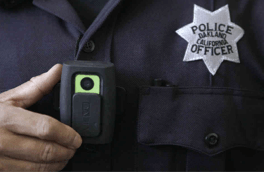In recent years, law enforcement agencies have been under significant pressure to increase transparency after a host of events have led local communities to lose faith in such agencies’ integrity. Concerns have escalated in recent months, particularly after a white police officer shot and killed Michael Brown, a black, unarmed 18-year old man on August 9, 2014, in Ferguson, Missouri. The circumstances of the shooting are in hot dispute, as witness reports differ as to whether Brown was surrendering before the fatal shots. No video surveillance of the incident is available. In hope of rebuilding its credibility after much criticism from the local community, the Ferguson police department has since added body cameras for its officers. Departments throughout the country are following closely behind.
Police chiefs who have implemented the use of body cameras suggest that there are several benefits and believe that both officers and citizens behave better while being recorded. The Department of Justice recently released a policy report on this issue, stating that “body-worn cameras help police departments ensure events are also captured from an officer’s perspective.” Civil rights advocates maintain that such cameras would prevent police officers from abusing their authority, while law enforcement groups believe that cameras would deter people from falsely accusing officers of abuse. Furthermore, the Police Foundation, an organization committed to law enforcement research, recently completed a study that found that body cameras dramatically lowered complaints of police abuse. The results suggested more than a 50% reduction in the total number of use-of-force incidents, as well as a significant reduction in citizen complaints against police officers.
However, the use of body cameras raises important questions of privacy and trust. A recent report by DOJ warns, “[A]s technology advances and expectations of privacy evolve, it is critical that law enforcement agencies carefully consider how the technology they use affects the public’s privacy rights, especially when courts have not yet provided guidance on these issues.” Currently, U.S. law enforcement agencies have not adopted a uniform policy for body cameras.The privacy issues raised by body cameras are more acute than those raised by traditional surveillance cameras. Unlike most traditional surveillance cameras, body cameras simultaneously record audio and video. Moreover, while traditional cameras only view public spaces, body cameras give officers the ability to record inside private homes and to record sensitive situations in the line of service. Further, body cameras capture images up-close, which could allow for the use of facial recognition technology.
Along those lines, there are concerns that the videos may be open to abuse. Privacy advocates are concerned that video footage of sensitive encounters will end up online. This appears to be the case in a city in Washington State, where a YouTube account flooded the police local department with public records requests for all body-camera footage. Although the chief said that the body cameras ensure accountability and that the results have been positive, the department is concerned about releasing footage of people with mental illness or domestic violence situations.
Another concern is that police may turn off the body cameras when they should be on. There are no general standards established for how and when the devices should be used. The New Orleans Police Department has recently been under scrutiny as data shows that when New Orleans police officers exert force in the field, most of those interactions are not being recorded, despite department protocols of body cameras.
Ultimately when implementing this technology, agencies should balance the need of transparency for police officers with the concerns for privacy of citizens. It will be an interesting issue to watch develop.
